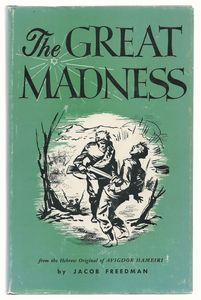Inscribed by translator "To Beatrice Schaffer with the best wishes"
"Hameiri was born in Dávidháza, Carpatho-Ukraine (then Hungary) . His first Hebrew poem "Ben he-Atid, " which appeared in the weekly Ha-Mizpeh, was followed by others in various Hebrew journals. His first volume of verse, entitled Mi-Shirei Avigdor Feuerstein, was published in 1912. Hameiri belongs to the earliest exponents of expressionism in Hebrew poetry. Sustained pathos, and strained and occasional exaggerated figures of speech characterize his work. He attacked the stagnation of Jewish life, described the gruesomeness and the frenzy of hatred that engulfed all of humanity during World War I and particularly the vulnerability of Jews to its consequences. After he settled in Palestine, he castigated the new Jewish society for not realizing its declared ideals. In 1968 he was awarded the Israel Prize.
From wikipedia:
Hameiri was born as Emil[1] or Avigdor Feuerstein in 1890, in the village of Odavidhaza (near Munkatsch), Carpathian Ruthenia in Austria Hungary. He emigrated to Mandate Palestine in 1921, where he became one of the original 16,000 freedom fighters in 1948. He published the State's first independent newspaper and helped to organize the worker's bank. His book, Hannah Senesh is an obligatory reading for all Israeli school children. Hameiri was the first poet to whom the title Israel's Poet Laureate was awarded.
Hameiri fought in World War I in the Austro-Hungarian army and recorded the events in his memoirs, The Great Madness (1929)[2] and Hell on Earth (1932).[3] The latter recounts his experiences as a POW of the Russians. Hameiri marched through Buczacz while fighting, and asked a civilian where the house of the famous Hebrew writer Shmuel Yosef Agnon was located. His books have been published in 12 languages.[4]
Alon Rachamimov writes that Hameiri's war stories "reveal the degree to which Jewish identification processes could be contextual, angst-ridden, and laden with contradictory tendencies. The extent to which Hameiri was aware of his struggles regarding notions of 'loyalty,' 'fatherland,' and 'patriotism'...illuminate the complexities of collective identification among Habsburg Jews."[5] Gershon Shaked argues that Hameiri's anti-war stance is rooted in his Judaism.[6]
He died in Israel on April 3, 1970.
